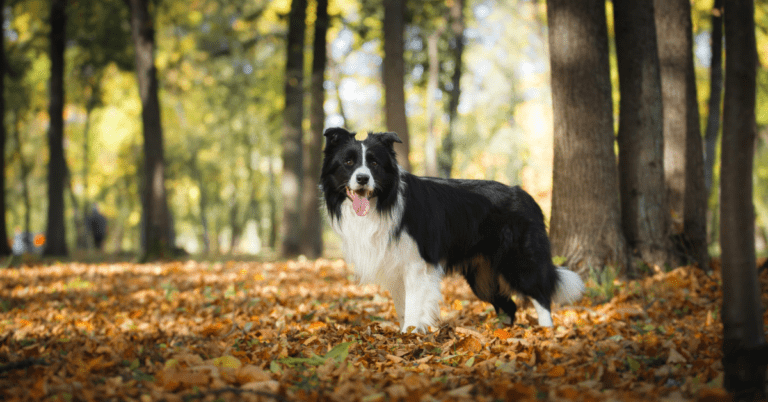Border Collie Hypoallergenic Top 7 Facts: Unveiling The Truth From The Fiction
Border Collie Hypoallergenic Top 7 Facts: Unveiling The Truth From The Fiction
Introduction
Are you an allergy sufferer and wondering about Border collie hypoallergenic status? In this blog post, we’ll dive into the truth behind Border Collie hypoallergenic claims. We’ll separate fact from fiction and explore how allergies can be managed for those who simply cannot resist the allure of these remarkable dogs. So grab a cup of tea (or tissues) as we embark on our quest to uncover the reality of whether Border Collies are truly hypoallergenic or not!
Understanding The Border Collie Hypoallergenic Status
When choosing a furry companion, allergies can put a damper on the excitement. Allergies to pet dander are quite common and can cause discomfort for those who suffer from them. That’s where Border collie hypoallergenic dog breeds come into play.
Border collie hypoallergenic breeds are often touted as being less likely to trigger allergic reactions in sensitive individuals. However, it’s important to note that no dog breed is truly hypoallergenic – they simply produce fewer allergens than others.
The term “hypoallergenic” refers to the reduced likelihood of causing an allergic reaction rather than complete immunity. These breeds typically have hair instead of fur, which means they shed less and produce fewer allergens. Additionally, their skin produces fewer oils that contribute to dander production.
It’s essential to understand that individual reactions may vary when it comes to allergies and dogs. What works for one person may not work for another, so it’s crucial for potential dog owners with allergies to spend time with different breeds before making a decision.
Remember that while some Border collie hypoallergenic breeds may be more tolerable for allergy sufferers, no breed guarantees an allergy-free experience. It’s always recommended for individuals with severe allergies or asthma symptoms to consult an allergist before bringing any dog into their homes.
Understanding Border collie hypoallergenic dog breeds is important in managing allergies effectively when considering adding a four-legged friend to your family. While these breeds may reduce the risk of triggering allergies in some individuals due to lower shedding and dander production, it’s essential for prospective owners with allergies or asthma symptoms always seek professional advice before committing.
Dispelling the Myth: Border Collie Hypoallergenic Status
When it comes to Border collie hypoallergenic dog breeds, there are a lot of misconceptions and myths floating around. One common misconception is that Border Collies are hypoallergenic. Let’s dive into this topic and separate fact from fiction.
It is important to understand what hypoallergenic actually means. A hypoallergenic dog breed is one that produces fewer allergens or has less dander, which can trigger allergic reactions in sensitive individuals. Unfortunately, Border Collies do not fall into this category.
Border Collies have a dense double coat that sheds moderately throughout the year. This shedding process releases dander into the environment, which can cause allergies in susceptible people. Additionally, their fur can trap other common allergens such as pollen or dust mites.
It’s worth noting that while no dog breed is completely hypoallergenic, some breeds may be more suitable for allergy sufferers than others. If you have allergies but still want a furry companion, consider researching breeds like poodles or bichon frises who are known for being more hypoallergenic.
If you already own a beloved Border Collie but struggle with allergies, there are steps you can take to manage your symptoms effectively. Regular grooming and bathing will help reduce the amount of dander on your pet’s coat and minimize its presence in your home environment.
In addition to grooming practices, it is crucial to maintain good overall cleanliness in your living space by vacuuming regularly and keeping bedding clean and free from allergens. Consider using air purifiers with HEPA filters as they can help remove airborne particles including pet allergens.
While we cannot guarantee that owning a Border Collie won’t trigger allergies for everyone, consulting with both an allergist and pet professional may provide guidance specific to your situation. They can offer personalized advice on managing allergic reactions while still enjoying the companionship of a Border Collie.
Border Collies are beautiful, intelligent, and loyal pets. However, unfortunately they are not hypoallergenic. With the right grooming and cleaning practices though, it is possible to manage allergic reactions in allergy-prone individuals while still having a wonderful pet.
Allergies and Border Collies: Common Triggers and Reactions
When it comes to allergies, there are a few common triggers that can affect both humans and dogs. For border collie owners who suffer from allergies, understanding these triggers is crucial in managing their symptoms.
One of the most common allergens associated with dogs is dander. Dander consists of tiny flecks of dead skin that can cause allergic reactions in sensitive individuals. Unfortunately, border collies are not immune to producing dander. However, some people may find that they have fewer allergic reactions to certain individual dogs within the breed.
Another potential trigger for allergies is saliva. When border collies groom themselves or lick their fur excessively, saliva can spread onto their coat and become airborne allergens. This can be problematic for allergy sufferers who come into contact with a border collie’s fur or even breathe in the air around them.
In addition to dander and saliva, other environmental factors such as pollen, dust mites, and mold can also trigger allergies in both humans and dogs alike. These substances may be present indoors or outdoors depending on your environment.
It’s important to note that each person’s sensitivity to allergens can vary greatly. While some individuals may experience severe allergic reactions upon exposure to certain allergens produced by border collies, others may only have mild symptoms or none at all.
If you’re considering getting a border collie but have allergies, it’s essential to spend time with individual dogs to determine the Border collie hypoallergenic status before making a decision. By interacting with different border collies beforehand, you’ll get a better sense of how your body reacts to specific animals within the breed.
Remember that managing allergies involves more than just choosing the right dog breed; it requires ongoing maintenance such as regular cleaning routines and minimizing exposure to known triggers like pollen or dust mites.
To ensure you’re well-informed about potential allergenicity issues related to owning a border collie if you have allergies, it’s best to consult with allergists and pet professionals.
Factors Affecting Allergenicity in Border Collies
When it comes to Border collie hypoallergenic allergies, there are various factors that can affect the allergenicity of a dog breed like the Border Collie. While no dog breed can be considered completely hypoallergenic, some individual dogs may produce fewer allergens or trigger milder reactions in certain individuals.
One factor that plays a role in allergenicity is the amount and type of dander produced by a Border Collie. Dander consists of tiny flecks of dead skin cells that can cause allergic reactions in sensitive individuals. Some dogs naturally produce less dander than others, which can make them more suitable for allergy sufferers.
Another factor is the level of saliva production. Dogs with excessive drooling or those who lick themselves frequently may spread more saliva on their fur, which can contain allergens. This increased saliva production might increase the likelihood of triggering allergies in susceptible individuals.
Furthermore, individual sensitivities to specific proteins found in a dog’s urine or saliva may also influence how allergic someone will be to a particular dog breed like Border Collies. It’s important to note that these sensitivities vary among individuals and cannot always be predicted based solely on breed characteristics.
Additionally, an allergic reaction can also be influenced by environmental factors such as pollen or dust present in the surrounding area where both humans and dogs live together. These external elements might exacerbate existing allergies even if the dog itself produces minimal allergens.
Understanding these various factors affecting allergenicity is crucial for prospective Border Collie owners who have allergies. By considering these factors and consulting with professionals experienced with both allergies and pets, individuals can make informed decisions about whether owning a Border Collie is suitable for them.
Remember: every person’s allergy sensitivity differs greatly! So before bringing any new pet into your home – especially if you have known allergies – consult with experts who specialize not only in allergies but also have experience with different breeds of dogs.
Managing Allergies with a Border Collie: Tips and Precautions
When it comes to managing allergies with a Border Collie, there are several tips and precautions you can take to minimize the risk of allergic reactions.
Maintaining good hygiene is essential. Regular bathing and grooming your Border Collie can help reduce allergens such as dander that may trigger allergies. Additionally, keeping your home clean by vacuuming regularly and using air purifiers can also help control allergens in the environment.
It’s important to establish boundaries within your home to create allergy-free zones. This means keeping your bedroom off-limits for your furry friend so that you have a safe space where you can retreat without worrying about allergic reactions.
Another helpful tip is to choose hypoallergenic bedding materials for both yourself and your Border Collie. Opting for bedding made from hypoallergenic fabrics can reduce the likelihood of triggering allergies while providing comfort for both you and your canine companion.
If possible, try to limit exposure to outdoor allergens such as pollen or mold by avoiding peak allergy seasons or taking precautionary measures during those times. For instance, wiping down paws after walks or using protective clothing outdoors can prevent allergen accumulation in your living spaces.
Consulting with an allergist or pet professional who specializes in allergies can provide tailored advice based on individual circumstances. They may recommend specific medications or treatments that could alleviate symptoms associated with dog-related allergies.
Remember that managing allergies with a Border Collie requires proactive measures rather than relying solely on their hypoallergenic status. By following these tips and taking necessary precautions, you can enjoy the companionship of this intelligent breed without compromising your health!
Hypoallergenic Alternatives: Breeds to Consider for Allergy Sufferers
If you or a family member suffers from allergies but still longs for the companionship of a furry friend, fear not! While Border Collies may not be hypoallergenic themselves, there are several other breeds that could be suitable for allergy sufferers.
One popular choice is the Poodle. With their curly, non-shedding coats, Poodles are often considered hypoallergenic. They come in various sizes, so whether you’re looking for a small toy Poodle or a larger standard Poodle, there’s an option to fit your lifestyle.
Another breed worth considering is the Bichon Frise. Known for their fluffy white coats and playful personalities, Bichon Frises produce less dander than many other breeds, making them a good choice for those with allergies.
For those who prefer smaller dogs, the Maltese could be a great option. These tiny dogs have long silky hair that requires regular grooming but sheds very little. Plus, they’re known to be friendly and affectionate companions.
If you’re more inclined towards medium-sized breeds, consider the Soft Coated Wheaten Terrier. With its wavy coat and charming personality, this breed tends to produce fewer allergens compared to some others.
If you’re looking for a larger dog that’s gentle and patient with kids and has minimal shedding tendencies? Look no further than the Portuguese Water Dog! This breed has curly fur that traps most of its dander rather than releasing it into the environment.
Remember though; every individual’s allergies are unique. It’s crucial to spend time around different breeds before bringing one home to ensure compatibility with your specific sensitivities!
So don’t despair if Border Collies aren’t ideal due to allergies – explore these hypoallergenic alternatives and find your perfect four-legged companion!
Grooming and Allergen Control for Border Collie Owners
Proper grooming is essential for all dog owners, especially those with allergies. While Border Collies are not hypoallergenic, there are steps you can take to minimize allergens in your home.
Regular brushing is crucial to keep your Border Collie’s coat healthy and reduce shedding. This will help prevent loose hair from spreading around your home and triggering allergic reactions. Use a high-quality brush that removes loose fur without irritating the skin.
Bathing your Border Collie every 4-6 weeks can also help control allergens. Choose a hypoallergenic shampoo specifically designed for dogs with sensitive skin. Avoid using human shampoos as they may contain ingredients that could cause irritation.
In addition to regular grooming, keeping your home clean is essential. Vacuum frequently using a vacuum cleaner equipped with a HEPA filter to trap allergens effectively. Pay special attention to furniture, carpets, and curtains where pet dander tends to accumulate.
Washing bedding regularly in hot water can also help eliminate allergens. Consider using allergen-proof covers on mattresses and pillows to further protect against exposure.
It’s important to remember that no amount of grooming or cleaning can completely eliminate allergens from your home if you have severe allergies. If you’re considering getting a Border Collie but suffer from allergies, consult with an allergist beforehand for guidance on managing potential Border collie hypoallergenic reactions effectively.
Remember, while proper grooming and cleaning practices can minimize allergy symptoms associated with owning a Border Collie, they do not make the breed hypoallergenic.
Consulting with Allergists and Pet Professionals
When it comes to managing allergies, it’s always best to seek guidance from experts in the field. Allergists and pet professionals can provide valuable insights and recommendations tailored specifically to your situation and the Border collie hypoallergenic status of your pet.
Allergists are medical professionals who specialize in diagnosing and treating allergies. They can help determine whether you’re allergic to Border Collies or any other specific allergens. An allergist will conduct tests, such as skin prick tests or blood tests, to identify potential triggers for your symptoms. This is very helpful in solving the Border collie hypoallergenic issues.
Pet professionals, such as veterinarians or dog trainers, can also offer helpful advice when it comes to dealing with Border collie hypoallergenic status. They may be able to recommend hypoallergenic grooming products or techniques that can minimize exposure to allergens.
Additionally, these experts can provide tips on creating an allergy-friendly environment for both you and your furry friend. They may suggest regular cleaning routines, using air purifiers or keeping certain areas of your home off-limits for your dog.
Remember that consulting with these professionals does not necessarily mean giving up on owning a Border Collie if you have allergies. With their expertise, they will guide you towards finding the right balance between managing your allergies while still enjoying the companionship of this wonderful breed.
So don’t hesitate! Reach out to allergists and pet professionals today for personalized advice on how best to navigate life with a Border Collie while managing your allergies effectively.
Conclusion
In the end, whether or not a Border Collie is hypoallergenic boils down to individual allergies and sensitivities. While some people may have no issues with these intelligent and energetic dogs, others may find that their allergies are triggered by certain allergens present in a Border Collie’s dander, saliva, or urine. It’s important for potential owners to consider their own allergies and consult with allergists before bringing a Border Collie into their home.
For those who do suffer from allergies but still want to enjoy the company of a dog, there are alternative breeds that are often considered more hypoallergenic. Breeds such as poodles, bichon frises, and schnauzers are often recommended for allergy sufferers due to their low-shedding coats.
However, it’s crucial to remember that even hypoallergenic breeds can still produce allergens and trigger reactions in sensitive individuals. Regular grooming and proper hygiene practices can help mitigate allergic reactions regardless of the breed.
Finding the right dog for allergy sufferers requires careful consideration of personal allergens as well as an understanding of how individual dogs may affect your symptoms. Consulting with allergists and pet professionals will provide valuable insights on managing allergies while enjoying the companionship of a furry friend.
Remember that every person’s experience with dog allergies is unique. If you’re considering getting a Border Collie despite having known allergies or sensitivities, be prepared for potential challenges and take necessary precautions to manage your symptoms effectively.
FAQ’s
Q. Are Border Collies hypoallergenic?
While some people may claim that Border Collies are hypoallergenic, the truth is that they are not. Border Collies produce allergens like dander and saliva, which can trigger allergies in sensitive individuals. So the Border collie hypoallergenic status can vary depending on the individual dog.
Q. What are common triggers for allergies in Border Collies?
Common triggers for allergies in Border Collies include their dander (dead skin cells), saliva, and urine. These allergens can cause symptoms such as sneezing, itching, watery eyes, and respiratory issues.
Q.. Can border collie owners reduce allergens in their homes?
Yes! While it’s challenging to completely eliminate allergens from your home when you have a pet dog like a Border Collie, there are steps you can take to minimize exposure. Regular grooming, cleaning surfaces frequently with allergy-friendly products, using air purifiers or HEPA filters, and keeping your dog out of bedrooms or certain areas of the house can help reduce allergen levels.
Q. Are there hypoallergenic alternatives to consider for allergy sufferers?
If you’re looking for a hypoallergenic alternative to a Border Collie but still want an intelligent and active breed, consider breeds such as Poodles, Bichon Frises, Portuguese Water Dogs or Schnauzers. These breeds generally produce fewer allergens than others.
Q. Should I consult with an allergist before getting a Border Collie?
It is highly recommended that individuals with known allergies or sensitivities consult with an allergist before bringing any dog into their home – including a breed like the Border Collie – so they have accurate information about potential risks and proper management techniques.
Q. Can regular grooming help manage allergies related to owning a Border Collie?
Yes! Regular grooming is essential for managing allergies related to owning any dog breed – including the non-hypoallergenic ones like the Border Collie. Frequent brushing, bathing, and keeping their coat well-maintained can help keep allergen levels in check.









